初中英语短语词汇的知识点总复习含解析(1)
初中英语总复习(全册)知识点归纳
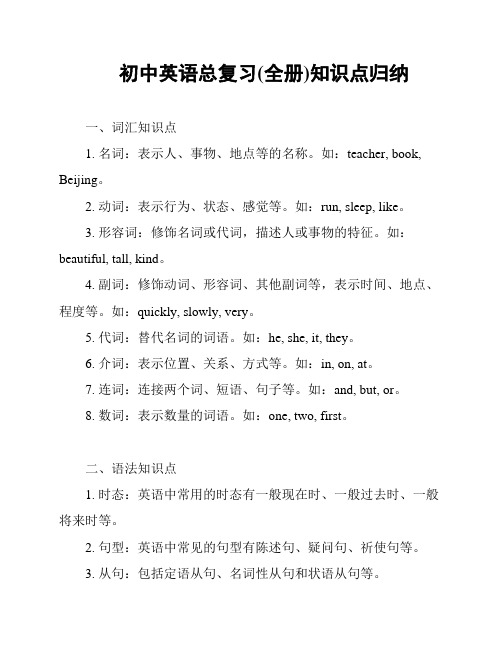
初中英语总复习(全册)知识点归纳一、词汇知识点1. 名词:表示人、事物、地点等的名称。
如:teacher, book, Beijing。
2. 动词:表示行为、状态、感觉等。
如:run, sleep, like。
3. 形容词:修饰名词或代词,描述人或事物的特征。
如:beautiful, tall, kind。
4. 副词:修饰动词、形容词、其他副词等,表示时间、地点、程度等。
如:quickly, slowly, very。
5. 代词:替代名词的词语。
如:he, she, it, they。
6. 介词:表示位置、关系、方式等。
如:in, on, at。
7. 连词:连接两个词、短语、句子等。
如:and, but, or。
8. 数词:表示数量的词语。
如:one, two, first。
二、语法知识点1. 时态:英语中常用的时态有一般现在时、一般过去时、一般将来时等。
2. 句型:英语中常见的句型有陈述句、疑问句、祈使句等。
3. 从句:包括定语从句、名词性从句和状语从句等。
4. 否定形式:在英语中通过在句子中加入否定词来表示否定的意思。
5. 疑问形式:在英语中通过改变句子语序或加入疑问词来构成疑问句。
6. 介词短语:一种由介词和它的宾语构成的结构,用来修饰名词或动词。
三、阅读技巧1. 抓主题:阅读时要注意抓住文章的主题,从中找出关键信息。
2. 理解词义:通过上下文,猜测不认识的单词的意思。
3. 推理推断:通过已知信息进行推理,得出未知信息。
4. 划重点:将文章中所述的重要信息标记出来,有助于记忆和理解。
5. 阅读速度:提高阅读速度的技巧有先读标题、段落开头和结尾。
以上是初中英语总复的知识点归纳,希望对你的复有所帮助!。
初中英语短语词汇的知识点总复习附解析

一、选择题1.The exam is over and the results will be on Friday afternoon.A.put down B.put off C.put up D.put away 2.—How much chocolate ice cream would you like, Linda?—, please. It’s my favorite.A.Only a little B.Just a few C.A lot D.None3.-What do you think of this story?-It's interesting, but Miss Lin asked us to __________ a story by ourselves, not to find one on the Internet.A.make up B.look up C.listen to D.take away4.We can’t trust him. He always some excuses for doing something wrong.A.makes up B.sets up C.takes up D.puts up5.As the road to the airport is under repair, we will have to _______ early to get there in time. A.turn off B.take off C.put off D.set off6.________, the Internet was only used by the government. But now it’s widely used in every field.A.As usual B.At first C.After all D.So far7.--Could you tell me some information about the hotels in your city?--Why not ______________ on the Internet?A.look for it B.to look for it C.look it up D.to look it up 8.—Let's go out for dinner.—Great! But Clean -Up Day is two weeks from now. We can't making a plan.A.take off B.see off C.put off D.cut off9.It took me almost a whole day to _____ so many emails.A.deal with B.cut in C.cheer for D.run out10.--- Alice’s room is tidy, isn't it?---Yes. She always _____ her toys after playing with them.A.looks forB.puts awayC.sweeps awayD.pays for11.--You hate that TV play, don’t you?--Not _______. I just think it’s a bit boring.A.likely B.exactly C.nearly D.carefully 12.The math problem is so difficult that only few students can _______.A.work on it B.work for it C.work it over D.work it out 13.—How about going hiking this weekend?—Sorry, I prefer _____ rather than ______.A.to stay at home, go out B.to go out, stay at homeC.staying at home, go out D.going out, stay at home.14.— Mom, let me help you with the dinner.— OK. Please wash two apples and ______.A.cut up them B.cut it up C.cut them up 15.—Sandy, you’d better _____ your notes before you do your homework every evening.—OK, I will, mum.A.look through B.look out C.look after D.look around 16.---Hong Kong’s richest, Li Ka-shing, announced plans to retire before his 90th birthday in July. ---It is reported his fortune is up to $37 billion. However, he led a dog’s life during his childhood. A.had a happy life B.lived a hard life C.lived with a dog17.— Although the product is popular, we still need to __________ new markets.—Right! We can sell them to other countries.A.open up B.give up C.look up18.Jackson __________ school two years ago and he __________ for two years. A.leaves; has gone B.left; has been awayC.leaves; has been away D.left; has gone19.一Most of the wild animals are because of their bad living environment.一So we must do something to save them.A.in need B.on dutyC.at work D.in danger20.The teachers and students are all friendly and the environment is quiet. ________, everything here is great.A.In case of B.In short C.Instead of21.________ your coat, please. It's cold today.A.Put on B.Look at C.Get in22.—Jane, your pens are under your desk. Please ________.—OK, Mom.A.put away it B.put it away C.put away them D.put them away 23.—Will the new term start next month?—No. It'll be________ until April because of the serious novel coronavirus epidemic.A.put on B.put away C.put up D.put off 24.Usually people with better education are able to get better jobs. ________, they have more chances to choose a good job.A.In other words B.On the other hand C.It's hard to say D.I'm afraid so 25.There were some big stones _______ my way _________ my way home yesterday. A.in; on B.on; in C.in; by D.at; by【参考答案】***试卷处理标记,请不要删除一、选择题1.C解析:C【解析】【分析】【详解】句意:考试结束了,考试结果将在周五下午张贴。
中考英语重点单词和短语用法大总结

中考英语重点单词和短语用法大总结一.重点单词用法总结:1. succeed - v. 成功- succeed in + 动名词 / 名词 / doing sth. - 在事上成功2. access - n. 进入,接近- have access to + 名词 - 能够接触事物3. advantage - n. 优势- take advantage of - 利用/趁...之机4. aim - n. 目标, v. 瞄准,旨在- take aim at - 瞄准物5. avoid - v. 避免- avoid + 动名词 / doing sth. - 避免做事6. behavior - n. 行为- behavior towards / toward - 对待...的行为7. benefit - n. 利益, 有益于, v. 有益于- benefit from - 从...中受益8. celebrate - v. 庆祝- celebrate + 假日/事件 - 庆祝一些假日/事件9. challenge - n. 挑战, v. 向...挑战- rise to the challenge - 迎接挑战10. contribute - v. 贡献, 捐赠- contribute to - 对...有贡献11. deceive - v. 欺骗- deceive + sb. into + 动名词 / doing sth. - 欺骗人做事12. determine - v. 决定,确定- determine to + 动词原形 - 决定要做事13. encourage - v. 鼓励- encourage + 名词 - 鼓励人/物14. equal - adj. 相等的- be equal to - 相等于15. establish - v. 确立,建立- establish + 名词 - 建立事物16. experience - n. 经验, v. 经历- gain / acquire experience - 获得经验17. include - v. 包括- include + 名词 - 包括事物18. increase - v./n. 增加- increase + 名词 - 增加事物19. influence - n. 影响, v. 影响- have / exert influence on - 对...有/施加影响20. introduce - v. 介绍- introduce + 名词 - 介绍人/物21. involve - v. 涉及,包括- involve + 名词/动名词 - 涉及/包含事物22. maintain - v. 维持- maintain + 名词/形容词 - 维持事物23. modify - v. 修饰,修改- modify + 名词/形容词 - 修改事物24. object - n. 物体, v. 反对- object + to + 名词/动名词/动词-ing - 反对事物/做事25. occur - v. 发生- occur + 名词/动名词 - 发生事物二.重点短语用法总结:1. by accident - 偶然地- I met her by accident at the supermarket.2. at ease - 放松- Please make yourself at ease.3. in charge - 负责- He is in charge of the project.5. in fact - 事实上- He is not a doctor. In fact, he is a nurse.6. in order to - 为了- I wake up early in order to catch the bus.7. on purpose - 故意- He dropped the glass on purpose.8. up to - 高达, 至多9. with the help of - 在...的帮助下- She finished the project with the help of her friends.。
七年级英语语法知识点短语

七年级英语语法知识点短语在七年级英语中,短语是极为重要的语法知识点,因为它们是构成句子的核心。
那么,什么是短语呢?短语是由一个或多个词组成的,其结构和功能上属于一个单元。
下面将分别介绍七年级英语中的常见短语和其使用方法。
动词短语动词短语是由一个或多个动词形成的一种短语。
在七年级英语中,动词短语通常由一个实义动词和一个或多个辅助动词构成,其中实义动词表示动作或状态,而辅助动词则表达动作的时态、语态、情态等。
例如:They have been waiting for an hour.他们已经等了一个小时。
在这个例句中,have been是一个由have和been组成的动词短语,其中have是辅助动词,表示现在完成时,而been是实义动词wait的过去分词形式。
介词短语介词短语是由介词和它后面的宾语组成的一种短语。
介词短语通常用来表示时间、地点、方向、原因等等。
例如:She is good at playing basketball.她擅长打篮球。
在这个例句中,at playing basketball是一个由介词at和它后面的宾语playing basketball组成的介词短语,其中playing basketball 是动名词短语,表示“打篮球”。
形容词短语形容词短语是由形容词和它后面的修饰成分组成的一种短语。
形容词短语通常用来修饰名词或代词,表示其性质、状态、特点等等。
例如:The girl in red is my sister.穿红衣服的女孩是我的妹妹。
在这个例句中,in red是一个由介词in和它后面的宾语red组成的介词短语,其中red是形容词,修饰girl这个名词。
副词短语副词短语是由副词和它后面的修饰成分组成的一种短语。
副词短语通常用来修饰动词、形容词、其他副词等等,表示程度、方式、时间、原因等等。
例如:He speaks English fluently.他讲英语非常流利。
在这个例句中,fluently是一个由副词fluent和后缀-ly组成的副词短语,修饰动词speaks,表示“流利地”。
初中英语常用短语词汇知识知识点复习(含答案解析)

一、选择题1.Which of the following ending has the same pronunciation “started”?A.hoped B.needed C.raised D.passed B解析:B【解析】【详解】句意:以下哪个单词结尾的发音与“ started”相同?考查单词的读音。
A. hoped希望;B. needed需要;C. raised提出;D. passed通过。
过去式started动词词尾为“t”,因此ed发/ id /音,hoped和passed动词词尾为清辅音,因此ed发/ t /音,needed动词词尾为“d”,因此ed发/ id /音,与started相同,raised动词词尾为t,d以外之浊辅音,因此ed发/ d /音,故选B。
【点睛】过去式“-ed”的发音规则:(1)动词词尾为“t,d”时,发/ id /音:want →wanted(要);need →needed (需要)。
(2)动词词尾为清辅音时,发/ t / 音:help →helped (帮助);laugh →laughed (笑);lo ok →looked (看);kiss →kissed (吻);wash →washed (洗);watch →watched (注视)。
(3)动词词尾为t,d以外之浊辅音或元音时,发/ d /音:call →called (叫);stay→stayed (停留);cry→cried (哭)。
2.I put my keys in my_____/bæg/.A.big B.box C.bag D.boy C解析:C【解析】【详解】句意:我把钥匙放在我的包里了。
考查语音。
A.big/ bɪg /大的;B. box/bɔks/盒子;C.bag/bæg/包;D.boy/ bɔɪ /男孩;根据语境我把钥匙放在我的包里了,再根据音标提示可知答案是bag,故答案选C。
初中英语知识点总结及整理

初中英语知识点总结及整理一、词汇与语法1. 词汇积累- 基础词汇:掌握日常生活中常用的名词、动词、形容词、副词、介词等。
- 主题词汇:根据话题如家庭、学校、食物、天气等,积累相关词汇。
- 短语搭配:了解并记忆常见短语,如动词短语、介词短语等。
2. 语法基础- 时态:一般现在时、一般过去时、一般将来时、现在进行时、过去进行时、将来进行时、现在完成时、过去完成时等。
- 语态:主动语态和被动语态的构成及用法。
- 非谓语动词:动名词、分词(现在分词和过去分词)的用法。
- 情态动词:can, could, may, might, must, should, ought to等的用法。
- 代词:人称代词、物主代词、反身代词、指示代词、疑问代词等。
- 冠词:不定冠词a/an和定冠词the的用法。
- 介词:常用介词的用法,如at, in, on, for, with等。
- 连词:并列连词(and, but, or等)和从属连词(because, although, if, when等)的用法。
- 句子结构:简单句、复合句(并列句和主从句)的构成。
二、阅读理解1. 阅读技巧- 快速阅读:通过略读(skimming)和扫读(scanning)快速获取文章大意。
- 精读:细致阅读,理解文章细节和深层含义。
- 推理判断:根据上下文推断生词含义,理解隐含信息。
2. 阅读题型- 事实细节题:找出文章中的具体信息。
- 主旨大意题:确定文章的主题或中心思想。
- 推理判断题:根据文章内容进行逻辑推理。
- 词义猜测题:猜测生词或短语的意思。
- 作者态度题:判断作者对某一观点或事物的态度。
三、写作技巧1. 写作类型- 描述性写作:描述人物、地点、事件等。
- 叙述性写作:叙述故事或事件的发展过程。
- 说明性写作:解释事物的性质、原因、过程等。
- 议论性写作:表达观点、提供论据、进行论证。
2. 写作结构- 引言:提出主题或背景信息。
- 正文:分段阐述观点或论据。
初中短语知识点总结

初中短语知识点总结在初中英语学习中,短语是一个非常重要的知识点。
掌握短语不仅可以丰富我们的词汇量,还可以让我们的语言表达更加生动和地道。
下面就让我们来总结一下初中英语中常见的一些短语知识点吧。
一、时间短语1. On time 准时2. In time 及时3. At a time 一次4. From time to time 时而5. At the same time 同时二、地点短语1. In the city 在城市里2. On the road 在路上3. At the bus stop 在公交车站4. By the sea 在海边5. Across the street 穿过大街6. Around the corner 在拐角处7. Under the tree 在树下8. In the sky 在天空中9. On the ground 在地上10. At the bottom 在底部11. At the top 在顶部12. At the front 在前面13. At the back 在后面14. In front of 在……前面15. Behind 在……后面16. Next to 在……旁边17. Near 在……附近18. Far from 远离19. To the north/south/east/west 向北/南/东/西20. At home 在家21. At school 在学校22. On the left/right 在左/右边23. On the side 在一侧24. In the middle 在中间25. At the end 在末尾三、动作短语1. Look for 寻找2. Look after 照顾3. Look up 查找4. Look out 当心5. Look forward to 期待6. Go on 继续7. Go out 出去8. Go off 离开9. Go away 离开10. Put on 穿上11. Take off 脱掉12. Take out 取出13. Take away 带走14. Bring in 带进来15. Bring up 提出16. Give in 放弃17. Give up 放弃18. Give back 归还19. Set out 出发20. Set up 建立21. Sit down 坐下22. Stand up 站起来23. Run away 逃跑24. Run out 用完25. Get up 起床26. Get in 进入27. Get off 下车28. Get on 上车29. Work out 解决30. Make up 编造31. Watch out 小心32. Hand in 交上33. Wait for 等待四、情感短语1. Cheer up 振作起来2. Calm down 平静下来3. Look forward to 期待4. Get along 和……相处5. Give up 放弃6. Carry on 继续7. Take care of 照顾8. Be afraid of 害怕9. Be fond of 喜欢10. Be interested in 对……感兴趣11. Be tired of 厌倦12. Be surprised at 对……感到惊讶13. Be worried about 担心14. Be angry with 生……的气15. Be good at 擅长16. Be bad at 不擅长17. Be sorry for 对……感到抱歉18. Be interested in 对……感兴趣19. Be nervous about 对……感到紧张20. Be happy about 对……感到高兴21. Be proud of 为……感到骄傲22. Be sure about 对……有把握23. Be honest with 对……诚实五、生活短语1. Go to bed 上床睡觉2. Get up 起床3. Have breakfast 吃早饭4. Have lunch 吃午饭5. Have dinner 吃晚饭6. Win the game 赢得比赛7. Lose the game 输掉比赛8. Save money 省钱9. Spend money 花钱10. Pay attention to 注意11. Take care of 照顾12. Make money 赚钱13. Do homework 做作业14. On one's way to 在某人的路上15. At the weekend 在周末16. On time 准时17. In time 及时18. Have a good time 玩得愉快19. Go for a walk 去散步20. Go to the cinema 去看电影六、交际短语1. How are you? 你好吗?2. What's your name? 你叫什么名字?3. Nice to meet you 很高兴见到你4. Thank you 谢谢你5. You're welcome 不客气6. Can I help you? 我可以帮你吗?7. I'm sorry 对不起8. Excuse me 对不起9. Where are you from? 你来自哪里?10. What's the matter? 出什么问题了?以上就是初中英语短语知识点的总结,希木可以帮助大家更好地学习和运用这些短语,使我们的语言表达更加准确和地道。
专为中考考生准备的初中英语常用短语、词语辨析
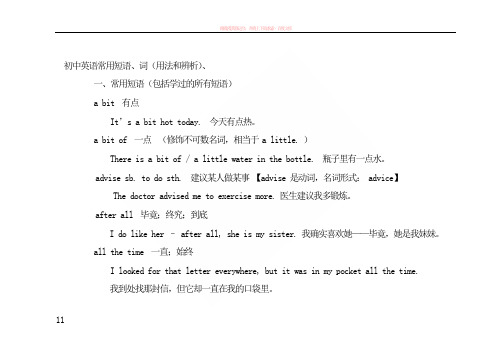
初中英语常用短语、词(用法和辨析)、一、常用短语(包括学过的所有短语)a bit 有点It’s a bit hot today. 今天有点热。
a bit of 一点(修饰不可数名词,相当于a little. )There is a bit of / a little water in the bottle. 瓶子里有一点水。
advise sb. to do sth. 建议某人做某事【advise 是动词,名词形式:advice】The doctor advised me to exercise more. 医生建议我多锻炼。
after all 毕竟;终究;到底I do like her – after all, she is my sister. 我确实喜欢她——毕竟,她是我妹妹。
all the time 一直;始终I looked for that letter everywhere, but it was in my pocket all the time.我到处找那封信,但它却一直在我的口袋里。
11and so on 等等Asas soon as 一……就……【由该短语引导的时间状语从句,需用一般现在时态表示将来时】I’ll call you as soon as I get there. 我一到那里就给你打电话。
as well (在口语中用得很多,用法和too 一样,两者可以互换,通常位于句末)I can do it as well. 我也能做这件事。
as well as 除……之外;并;和;也He gave me money as well as advice. 他除了给我中告外,还给了我钱。
ask for 请求;要①ask for +某人意思是:找某人,要求见某人Someone is asking for you at the door. 门口有人找你。
②ask for +某物意思是:要某物He wants to ask for some water. 他想要些水。
初中英语总复习知识点总结
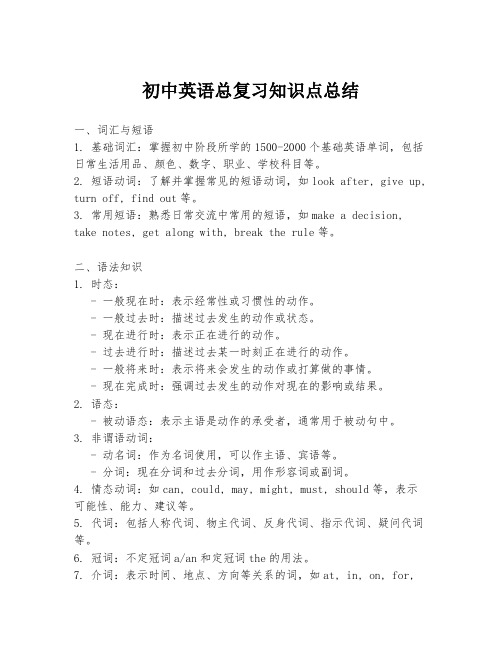
初中英语总复习知识点总结一、词汇与短语1. 基础词汇:掌握初中阶段所学的1500-2000个基础英语单词,包括日常生活用品、颜色、数字、职业、学校科目等。
2. 短语动词:了解并掌握常见的短语动词,如look after, give up, turn off, find out等。
3. 常用短语:熟悉日常交流中常用的短语,如make a decision, take notes, get along with, break the rule等。
二、语法知识1. 时态:- 一般现在时:表示经常性或习惯性的动作。
- 一般过去时:描述过去发生的动作或状态。
- 现在进行时:表示正在进行的动作。
- 过去进行时:描述过去某一时刻正在进行的动作。
- 一般将来时:表示将来会发生的动作或打算做的事情。
- 现在完成时:强调过去发生的动作对现在的影响或结果。
2. 语态:- 被动语态:表示主语是动作的承受者,通常用于被动句中。
3. 非谓语动词:- 动名词:作为名词使用,可以作主语、宾语等。
- 分词:现在分词和过去分词,用作形容词或副词。
4. 情态动词:如can, could, may, might, must, should等,表示可能性、能力、建议等。
5. 代词:包括人称代词、物主代词、反身代词、指示代词、疑问代词等。
6. 冠词:不定冠词a/an和定冠词the的用法。
7. 介词:表示时间、地点、方向等关系的词,如at, in, on, for,with等。
8. 连词:连接句子或句子成分的词,如and, but, or, because, although等。
三、句型结构1. 简单句:只有一个主谓结构的句子。
2. 并列句:用并列连词连接的两个或多个简单句。
3. 复合句:包含主句和从句的句子,从句可以是名词性从句、定语从句或状语从句。
- 名词性从句:包括主语从句、宾语从句、表语从句和同位语从句。
- 定语从句:修饰名词或代词的从句,通常由关系代词who, whom, whose, which, that等引导。
九年级英语短语知识点总结

九年级英语短语知识点总结短语(phrases)在英语中扮演着非常重要的角色,它们通常由两个或多个单词组成,具有固定的搭配和特定的意义。
掌握常用的英语短语对于提高语言表达能力和理解能力至关重要。
本文将总结九年级英语短语的知识点,并为读者提供几个常见的短语分类。
1. 介词短语(Prepositional Phrases)介词短语由一个介词和其后的名词、代词或动名词构成。
介词短语用于描述时间、地点、方向、关系等。
例子:- in the park(在公园)- at school(在学校)- on the table(在桌子上)- by the river(在河边)- with my friends(和我的朋友们一起)2. 动词短语(Verb Phrases)动词短语由一个主要动词和其后的副词、介词或名词构成。
动词短语用于表达动作、状态、行为、感受等。
例子:- look forward to(期待)- give up(放弃)- get along with(与……相处)- take care of(照顾)- go for a walk(去散步)3. 名词短语(Noun Phrases)名词短语由一个名词和其后的限定词、形容词、代词等构成。
名词短语用于描述人、物、地点等。
例子:- a cup of tea(一杯茶)- the blue sky(蓝天)- my best friend(我最好的朋友)- a book on the shelf(书架上的一本书)- the city center(市中心)4. 形容词短语(Adjective Phrases)形容词短语由一个形容词和其后的名词、动词、副词等构成。
形容词短语用于描述人、动物、物体等的特征或状态。
例子:- extremely beautiful(非常美丽)- highly recommended(强烈推荐)- deeply saddened(深感悲痛)- incredibly fast(飞快地)- widely accepted(广泛接受的)5. 副词短语(Adverb Phrases)副词短语由一个副词和其后的介词、形容词、名词等构成。
初中英语知识点总结复习

初中英语知识点总结复习一、词汇学习1. 单词拼写:掌握常用的英语单词拼写规则,注意元音字母和辅音字母的组合,以及常见的不规则变化。
2. 词性变化:了解名词、动词、形容词、副词等词性的构成和变化规则,如名词的单复数形式,动词的时态变化,形容词和副词的比较级和最高级形式。
3. 词组搭配:熟悉常见的英语词组和短语搭配,如动词短语、介词短语等,并能在句子中正确使用。
二、语法知识1. 时态:掌握一般现在时、一般过去时、一般将来时、现在进行时、过去进行时、将来进行时、现在完成时、过去完成时和将来完成时等基本时态的构成和用法。
2. 语态:了解主动语态和被动语态的转换规则,以及在不同情境下的运用。
3. 非谓语动词:学习动名词、分词(现在分词和过去分词)和不定式的用法,以及它们在句子中的作用。
4. 句子结构:理解简单句、并列句和复合句(包括定语从句、状语从句、宾语从句等)的结构和用法。
5. 代词:掌握人称代词、物主代词、反身代词、指示代词、疑问代词、不定代词等的用法。
6. 冠词:了解不定冠词(a/an)和定冠词(the)的用法,以及在特定情况下的省略规则。
三、阅读理解1. 快速阅读:培养快速阅读技巧,通过略读(skimming)和扫读(scanning)获取文章大意和具体信息。
2. 深入理解:通过精读(intensive reading),理解文章的主旨大意、细节信息、作者态度和写作目的。
3. 推理判断:学会根据上下文线索推断生词含义,以及对文章中隐含的信息进行逻辑推理。
4. 阅读策略:运用预测、归纳、总结等策略,提高阅读理解的效率和准确度。
四、写作技巧1. 文章结构:掌握英语写作的基本结构,包括引言、正文和结尾,学会使用主题句和过渡句。
2. 写作风格:了解不同文体(如叙述文、说明文、议论文)的写作特点和要求。
3. 语言表达:学会使用恰当的词汇、短语和句型,使文章表达清晰、准确、连贯。
4. 写作练习:通过日常的写作练习,如写日记、书信、故事、摘要等,提高写作能力。
初中英语必背知识点(专题复习)
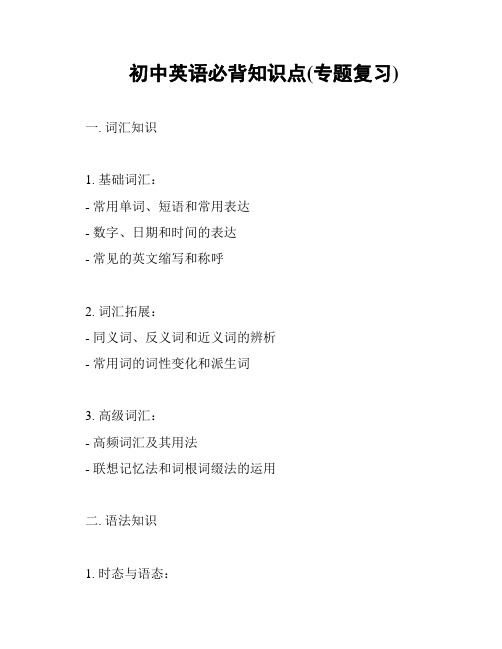
初中英语必背知识点(专题复习)
一. 词汇知识
1. 基础词汇:
- 常用单词、短语和常用表达
- 数字、日期和时间的表达
- 常见的英文缩写和称呼
2. 词汇拓展:
- 同义词、反义词和近义词的辨析
- 常用词的词性变化和派生词
3. 高级词汇:
- 高频词汇及其用法
- 联想记忆法和词根词缀法的运用
二. 语法知识
1. 时态与语态:
- 现在、过去和将来时的用法
- 被动语态的构成和应用
2. 句子结构:
- 主谓一致和主谓宾的搭配
- 并列句、复合句和简单句的转换
3. 修辞手法:
- 比喻、拟人和夸张的运用
- 省略、倒装和强调的使用
三. 阅读理解
1. 阅读技巧:
- 标题、目的和主题的推测
- 推理、推断和判断的训练
2. 阅读策略:
- 首句和细节的关键把握
- 上下文和语境的理解
四. 写作技巧
1. 作文要求:
- 书信、应用文和议论文的写作
- 开头、结尾和段落的构思
2. 写作方法:
- 归纳、列举和论证的技巧
- 表达清晰、连贯和正确的方法
以上是初中英语必背知识点的专题复,通过掌握这些知识,能够更好地应对英语考试,提高自己的语言水平。
(字数:xxx)。
初中英语短语总知识点总结

初中英语短语总知识点总结初中英语短语是英语学习的基础,掌握这些短语对于提高英语水平至关重要。
以下是一份初中英语短语的总知识点总结,旨在帮助学生巩固和扩展他们的英语词汇和表达能力。
1. 动词短语- ask for 请求- call on 拜访- come across 偶然遇到- come from 来自- come in 进入- come on 快点;加油- come out 发行;出现- come up 出现;提出- do homework 做家庭作业- do well in 在...方面做得好- find out 发现;查明- give up 放弃- go after 追赶- go away 离开- go by 经过- go on 继续- go out 出去- hand in 提交- help with 帮助...做某事- look after 照顾- look for 寻找- look like 看起来像- look over 仔细检查- make up 编造;化妆- make friends with 与...交朋友- put off 推迟- run after 追赶- run into 撞上;偶然遇到- set up 建立- take after 与...相像- think of 想起- turn on 打开(电器)- turn off 关闭(电器)- wait for 等待2. 介词短语- at first 起初- at last 最后- at the moment 此刻- by accident 偶然- by the way 顺便说一下- for example 例如- in a hurry 匆忙地- in front of 在...前面- in the middle of 在...中间- on time 准时- out of 从...中出去- over and over 再三地- to one's surprise 令某人惊讶的是3. 形容词短语- all right 好的- at large 未被捕获的;一般性的- at risk 有风险的- by mistake 错误地- in order 整齐地;按顺序- in trouble 处于困境- in use 在使用中- on purpose 故意地- out of control 失去控制- out of date 过时的- out of order 出故障的;无序的- out of work 失业4. 常用表达- as soon as possible 尽快- as well as 也;和...一样- as...as 和...一样- even if 即使- rather than 而不是- not only...but also 不仅...而且- one after another 一个接一个- once in a while 偶尔- once upon a time 从前- so far 到目前为止- such as 例如- too...to 太...以至于不能5. 连接短语- as well as 以及- both...and... ...和...- either...or... 要么...要么...- neither...nor... 既不...也不...- not only...but (also) 不仅...而且...- not...until... 直到...才...- either...or... 要么...要么...- first...second... 首先...其次...- last but not least 最后但也很重要6. 情态动词短语- can't wait 迫不及待- have to 必须- may as well 还不如- might as well 也许最好- must have done 一定做过- needn't have done 本不必做- should have done 本应该做- would rather 宁愿通过掌握这些短语,学生可以更自信地进行日常交流,理解和写作。
初中英语总复习知识点归纳(基本全了)
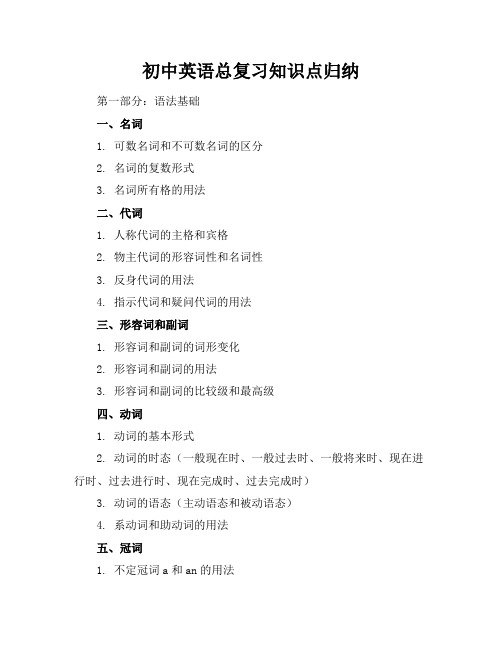
初中英语总复习知识点归纳第一部分:语法基础一、名词1. 可数名词和不可数名词的区分2. 名词的复数形式3. 名词所有格的用法二、代词1. 人称代词的主格和宾格2. 物主代词的形容词性和名词性3. 反身代词的用法4. 指示代词和疑问代词的用法三、形容词和副词1. 形容词和副词的词形变化2. 形容词和副词的用法3. 形容词和副词的比较级和最高级四、动词1. 动词的基本形式2. 动词的时态(一般现在时、一般过去时、一般将来时、现在进行时、过去进行时、现在完成时、过去完成时)3. 动词的语态(主动语态和被动语态)4. 系动词和助动词的用法五、冠词1. 不定冠词a和an的用法2. 定冠词the的用法3. 不使用冠词的情况六、连词1. 并列连词的用法2. 从属连词的用法七、介词1. 常用介词的用法2. 介词短语的结构和用法八、数词1. 基数词和序数词的用法2. 分数、小数和百分数的表达九、感叹词1. 感叹词的用法十、疑问词1. 疑问词的用法十一、句型结构1. 简单句的五种基本句型2. 并列句和复合句的结构和用法十二、主谓一致1. 主谓一致的原则2. 主谓一致的特殊情况十三、倒装句1. 完全倒装和部分倒装的区别2. 常见的倒装句型十四、省略句1. 省略句的结构和用法十五、强调句1. 强调句的结构和用法十六、虚拟语气1. 虚拟语气的用法十七、情态动词1. 情态动词的用法十八、非谓语动词1. 非谓语动词的分类和用法十九、固定搭配1. 常见的固定搭配二十、习惯用语和俚语1. 常见的习惯用语和俚语第二部分:词汇与短语一、词汇记忆方法1. 词根词缀记忆法2. 同义词和反义词记忆法3. 分类记忆法4. 联想记忆法二、常见词汇和短语1. 常用动词短语2. 常用形容词短语3. 常用介词短语4. 常用连词短语5. 常用固定搭配三、词汇辨析1. 形近词辨析2. 意思相近的词辨析3. 语境辨析四、词汇应用1. 词汇在句子中的应用2. 词汇在段落中的应用3. 词汇在文章中的应用五、词汇扩展1. 通过阅读扩展词汇2. 通过听力扩展词汇3. 通过口语和写作扩展词汇六、词汇复习策略1. 制定词汇复习计划2. 定期进行词汇测试3. 反复记忆和复习第三部分:阅读理解一、阅读技巧1. 快速阅读2. 精读3. 猜词技巧4. 理解文章主旨和大意5. 找出文章中的细节信息二、阅读题型1. 主旨大意题2. 细节理解题3. 推理判断题4. 词义猜测题5. 观点态度题三、阅读材料1. 故事类文章2. 议论文3. 说明文4. 应用文5. 新闻报道四、阅读理解策略1. 预览文章和首段2. 扫读文章找出关键词3. 仔细阅读理解文章内容4. 回答问题时注意关键词和语境5. 验证答案是否符合文章内容第四部分:写作技能一、写作技巧1. 确定写作目的和主题2. 拟定写作提纲3. 运用适当的句型和词汇4. 保持文章逻辑清晰5. 注意文章格式和标点符号二、写作题型1. 记叙文2. 议论文3. 说明文4. 应用文5. 日记和书信三、写作素材1. 人物描写2. 地点描写3. 事件描写4. 情感表达5. 观点陈述四、写作策略1. 多读优秀范文2. 多练习写作3. 请教老师和同学4. 反复修改和润色5. 保持写作兴趣和热情第五部分:听力理解一、听力技巧1. 预测听力内容2. 抓住关键词和关键信息4. 边听边记笔记5. 理解对话和独白的逻辑关系二、听力题型1. 简单听力理解题2. 听力细节理解题3. 听力推理判断题4. 听力主旨大意题5. 听力词义猜测题三、听力材料1. 对话2. 独白3. 新闻报道4. 广播节目5. 电影和电视剧片段四、听力理解策略1. 预览问题和选项2. 仔细听录音,注意关键词3. 根据听力内容进行推理和判断4. 选择最符合听力内容的答案5. 检查答案是否符合题意第六部分:口语表达一、口语技巧1. 准备话题和内容3. 保持语速适中4. 注意语法和词汇的准确性5. 保持自信和流畅二、口语题型1. 自我介绍2. 话题讨论3. 角色扮演4. 观点陈述5. 回答问题三、口语素材1. 日常生活话题2. 学校生活话题3. 社会热点话题4. 个人兴趣爱好话题5. 旅游和文化话题四、口语表达策略1. 多听多说,提高口语能力2. 模仿优秀的口语表达3. 与老师和同学进行口语练习4. 参加英语角和口语比赛5. 记录自己的口语表达,进行反思和改进第七部分:综合技能一、综合技巧1. 综合运用语法、词汇、阅读、写作、听力和口语等技能2. 注重语言的实际运用能力3. 提高语言的综合运用水平4. 培养跨文化交际能力5. 保持学习英语的兴趣和动力二、综合题型1. 完形填空2. 阅读理解3. 写作4. 听力理解5. 口语表达三、综合复习策略1. 制定综合复习计划2. 定期进行综合测试3. 反复练习和复习4. 请教老师和同学5. 保持学习英语的兴趣和热情。
初中英语短语词汇的专项训练解析含答案(1)
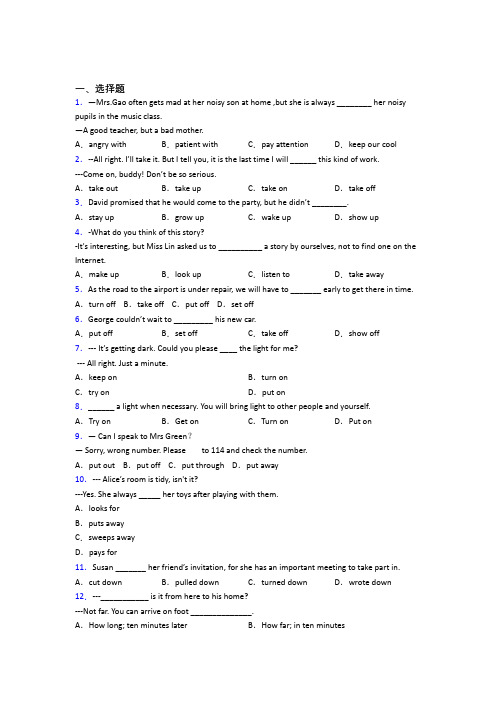
13.I have a poor memory so I have to ______ my phone number book every time I want to make a call.
A.cut downB.pulled downC.turned downD.wrote down
12.---___________ is it from here to his home?
---Not far. You can arrive on foot ______________.
A.How long; ten minutes laterB.How far; in ten minutes
A.find outB.clear outC.look for
15.He spent________money last month, so he had to cancel his plan for travel.
A.many tooB.too manyC.too muchD.much too
16.When you don’t know how to deal with a problem, you can ________ Miss Gao.
9.— Can I speak to Mrs Green?
— Sorry, wrong number. Please to 114 and check the number.
A.put out B.put off C.put through D.put away
10.--- Alice’s room is tidy, isn't it?
初中英语语法知识—状语从句的知识点总复习含解析(1)

一、选择题1.Sam won’t make any progress ______ he studies harder than before.A.if B.when C.because D.unless 2.—the water was cold , Wei Qinggang jumped into it to save others.A.Although B.When C.If D.Because3.I watched the World Cup in a bar last night and I home 1:00 in the morning. A.go; until B.went; untilC.didn’t go; until D.won’t go; until4.Jenny often eats a lot of fruit andvegetables_______she knows they are good for health.A.because B.but C.or5.Although he _______up very early this morning, _______he was still late for school. A.get ; and B.got;/ C.gets ;so D.got ; but 6.It’s________a difficult question that few of us can answer it.A.quite B.so C.such D.very7.— Would you please ask Tom to come to my office?—Sure, I will tell you about it as soon as he _______back tomorrow.A.will come B.came C.comes D.is coming8.______ we have different opinions from time to time, we are still good friends.A.Until B.After C.Because D.Though 9.— What shall we do now?—__________ it’s raining hard, let’s stay at home.A.So B.Since C.Though D.Otherwise 10.Chinese market is________a big one________you should all come and see what it has to offer.A.so, that B.such, that C.enough, that D.too, to11.I’ll finish the task, ________ how long it takes.A.even though B.so that C.no matter12.The lady was _____ happy _____she couldn't say a word when she heard the good news.()A.too; to B.very; becauseC.so;that13.—Mom, I’m leaving for Beijing tomorrow.—That’s nice. You’d better ring me up________you get there.A.as soon as B.until C.while14.— What should I do if I ______ behind others in my study?— You are going to work really hard to catch up with them.A.fall B.will fall C.fell15.I’ll go to vi sit my aunt in England the summer holidays start.A.as soon as B.since C.unless16.—Are you going to Mary’s party tonight?—No, I won’t go__________ you go.A.because B.when C.unless D.though17.Our teachers have been with us for nearly three years we came to junior high school. We should thank them for what they have done for us.A.until B.before C.since D.while18.__________ what he explains to you, just don’t believe him.A.However B.Even though C.But D.No matter 19.—How’s the weather tomorrow?—I don’t know if it ___________ tomorrow.—Well, if it ___________, I won’t go out with you.A.will rain; will rain B.rains; rainsC.rains; will rain D.will rain; rains20.I didn't accept his help ________ I wanted to try it myself.A.because B.thoughC.until D.unless21.The policeman asks the child not to cross the street ________ the traffic light turns green. A.when B.until C.because D.after22.Mr.Green doesn’t have any hobbies________ you call watching TV a hobby.A.though B.unless C.because23.It ________ heavily when I left the movie theater.A.rains B.was raining C.is raining D.will rain 24.—It’s raining heavily outside.—So stay here and don’t go out ______ it stops.A.when B.until C.if25.—Has Jim known the good news?—Not yet. I will tell him about it ________ he comes back.A.while B.until C.as soon as D.since【参考答案】***试卷处理标记,请不要删除一、选择题1.D解析:D【解析】【详解】句意:Sam不会取得任何进步,除非他比之前更努力的学习。
初中英语知识点总结及答案

初中英语知识点总结及答案一、词汇与语法1. 词汇积累- 常用基础词汇:掌握日常生活、学习、娱乐等相关词汇。
- 词性变化:了解名词、动词、形容词、副词等词性的构成和变化规则。
- 词组搭配:熟悉动词短语、介词短语等固定搭配的用法。
2. 语法基础- 时态:掌握一般现在时、一般过去时、一般将来时等基本时态的构成和用法。
- 语态:了解主动语态和被动语态的区别及转换方法。
- 非谓语动词:学习动名词、分词(现在分词和过去分词)的构成和用法。
- 句子结构:熟悉简单句、并列句和复合句(包括定语从句、状语从句等)的构成。
二、阅读理解1. 阅读技巧- 快速阅读:通过扫读(Skimming)和查读(Scanning)快速获取文章大意和细节信息。
- 推理判断:根据上下文线索推断生词含义和隐含信息。
2. 题型解析- 事实细节题:定位原文,准确理解并找出答案。
- 主旨大意题:抓住文章标题、首尾段落和主题句,概括文章中心。
- 推理判断题:分析文章逻辑关系,推断作者意图和文章隐含意义。
三、写作技巧1. 文章结构- 开头:引入话题,明确文章主题。
- 正文:分段论述,每段一个中心句,后跟支持细节。
- 结尾:总结全文,呼应开头,提出看法或建议。
2. 写作类型- 描述文:描述人物、地点、事件等,使用形象语言。
- 叙事文:讲述故事或经历,注意时态和顺序。
- 议论文:表达观点,提供论据,进行逻辑论证。
四、听力理解1. 听力技巧- 预测内容:根据题目或问题预测对话或文章内容。
- 注意关键词:抓住对话或文章中的重要信息点。
2. 题型解析- 对话理解:理解对话双方的主要意思和意图。
- 短文理解:把握短文大意和细节信息。
- 听写填空:准确填写听到的单词或短语。
五、口语表达1. 日常交流- 问候与介绍:学会基本的问候语和自我介绍。
- 情感表达:掌握表达喜怒哀乐等情感的基本句型。
2. 话题讨论- 表达观点:使用第一人称表达个人看法。
- 理由陈述:提供支持观点的理由和例证。
【最新推荐】初中英语语法知识点总结 (1)

英语语法大全初中英语语法学习提纲一、词类、句子成分和构词法:1、词类:英语词类分十种:名词、形容词、代词、数词、冠词、动词、副词、介词、连词、感叹词。
1、名词(n.):表示人、事物、地点或抽象概念的名称。
如:boy, morning, bag, ball, class, orange.2、代词(pron.):主要用来代替名词。
如:who, she, you, it .3、形容词(adj..):表示人或事物的性质或特征。
如:good, right, white, orange .4、数词(num.):表示数目或事物的顺序。
如:one, two, three, first, second, third, fourth.5、动词(v.):表示动作或状态。
如:am, is,are,have,see .6、副词(adv.):修饰动词、形容词或其他副词,说明时间、地点、程度等如:now, very, here, often, quietly, slowly.7、冠词(art..):用在名词前,帮助说明名词。
如:a, an, the.8、介词(prep.):表示它后面的名词或代词与其他句子成分的关系。
如in, on, from, above, behind.9、连词(conj.):用来连接词、短语或句子。
如and, but, before .10、感叹词(interj..)表示喜、怒、哀、乐等感情。
如:oh, well, hi, hello.2、句子成分:英语句子成分分为七种:主语、谓语、宾语、定语、状语、表语、宾语补足语。
1、主语是句子所要说的人或事物,回答是“谁”或者“什么”。
通常用名词或代词担任。
如:I’m Miss Green.(我是格林小姐)2、谓语动词说明主语的动作或状态,回答“做(什么)”。
主要由动词担任。
如:Jack cleans the room every day. (杰克每天打扫房间)3、表语在系动词之后,说明主语的身份或特征,回答是“什么”或者“怎么样”。
初中英语必考知识点总结
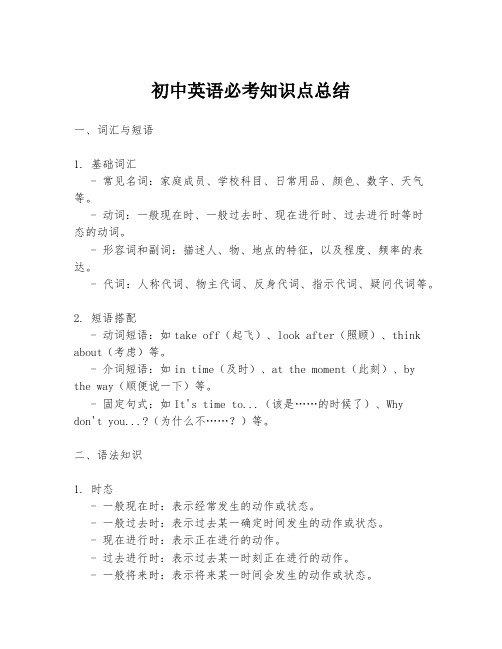
初中英语必考知识点总结一、词汇与短语1. 基础词汇- 常见名词:家庭成员、学校科目、日常用品、颜色、数字、天气等。
- 动词:一般现在时、一般过去时、现在进行时、过去进行时等时态的动词。
- 形容词和副词:描述人、物、地点的特征,以及程度、频率的表达。
- 代词:人称代词、物主代词、反身代词、指示代词、疑问代词等。
2. 短语搭配- 动词短语:如take off(起飞)、look after(照顾)、think about(考虑)等。
- 介词短语:如in time(及时)、at the moment(此刻)、by the way(顺便说一下)等。
- 固定句式:如It's time to...(该是……的时候了)、Whydon't you...?(为什么不……?)等。
二、语法知识1. 时态- 一般现在时:表示经常发生的动作或状态。
- 一般过去时:表示过去某一确定时间发生的动作或状态。
- 现在进行时:表示正在进行的动作。
- 过去进行时:表示过去某一时刻正在进行的动作。
- 一般将来时:表示将来某一时间会发生的动作或状态。
2. 语态- 被动语态:表示动作的承受者成为句子的主语。
- 常见时态的被动语态形式。
3. 非谓语动词- 动名词:作为名词使用,可以作主语、宾语等。
- 分词:现在分词和过去分词,用作形容词或副词。
- 不定式:作为名词、形容词、副词等使用。
4. 句子结构- 简单句:只有一个主语和谓语的句子。
- 并列句:由两个或多个简单句通过并列连词连接而成。
- 复合句:包含主句和从句的句子,从句可以是名词性从句、定语从句或状语从句。
5. 特殊句式- 倒装句:在某些特定条件下,句子的主语和谓语可以颠倒。
- 省略句:在某些情况下,句子中的某些成分可以省略。
三、阅读理解1. 快速阅读- 通过扫读(Skimming)和查读(Scanning)快速获取文章大意和细节信息。
2. 细节理解- 理解文章中具体的事实和细节,包括数字、时间、地点等。
- 1、下载文档前请自行甄别文档内容的完整性,平台不提供额外的编辑、内容补充、找答案等附加服务。
- 2、"仅部分预览"的文档,不可在线预览部分如存在完整性等问题,可反馈申请退款(可完整预览的文档不适用该条件!)。
- 3、如文档侵犯您的权益,请联系客服反馈,我们会尽快为您处理(人工客服工作时间:9:00-18:30)。
一、选择题1.---Mum, I think I need a bigger room.---You should throw away your old toys. They have _______ too much space.A.taken up B.taken place C.taken off2.—The fire was finally____ in Jilin on June 3. Unfortunately, 119 people lost their lives. —I hope the accident like this won’t happen again.A.put down B.put away C.put out D.put up 3.--All right. I’ll take it. But I tell you, it is the last time I will ______ this kind of work.---Come on, buddy! Don’t be so serious.A.take out B.take up C.take on D.take off 4.We can’t trust him. He always some excuses for doing something wrong. A.makes up B.sets up C.takes up D.puts up 5.George couldn’t wait to _________ his new car.A.put off B.set off C.take off D.show off 6.—You look so sad. What happened?一The exam to be much harder than I thought.A.broke out B.carried out C.put out D.turned out7.—Who is your favorite singer, Mike?—TF Boys. They are very ____ boys and girls.A.proud of B.popular withC.strict with D.worried about8.It took me almost a whole day to _____ so many emails.A.deal with B.cut in C.cheer for D.run out 9.--- Alice’s room is tidy, isn't it?---Yes. She always _____ her toys after playing with them.A.looks forB.puts awayC.sweeps awayD.pays for10.There were some big stones _______ my way _________ my way home yesterday. A.in; on B.on; in C.in; by D.at; by11.—How about going hiking this weekend?—Sorry, I prefer _____ rather than ______.A.to stay at home, go out B.to go out, stay at home C.staying at home, go out D.going out, stay at home.12.---___________ is it from here to his home?---Not far. You can arrive on foot ______________.A.How long; ten minutes later B.How far; in ten minutesC.How far; after ten minutes D.How long; in ten minutes13.—When do you think is the best time to visit Yancheng?—You come here in spring or autumn. The weather is quite pleasant.A.had better B.would rather C.have to D.would like14.Not until the police began to look into(调查) the accident did he tell me ________ what was on that afternoon.A.by mistake B.by accident C.in person D.in total 15.—You are good at playing the piano, aren’t you?—Yes, I am. Besides it, I also do well in playing the violin.A.In addition to B.Because of C.Ahead of16.— Did you see Mike at the harbor (港口) yesterday?—No, I didn’t. When I arrived there, the ship had _____________.A.flown away B.looked around C.set sail17.— Although the product is popular, we still need to __________ new markets.—Right! We can sell them to other countries.A.open up B.give up C.look up18.Jackson __________ school two years ago and he __________ for two years. A.leaves; has gone B.left; has been awayC.leaves; has been away D.left; has gone19.When you don’t know how to deal with a pro blem, you can ________ Miss Gao.A.turn to B.ask for C.think about20.The teachers and students are all friendly and the environment is quiet. ________, everything here is great.A.In case of B.In short C.Instead of21.________ your coat, please. It's cold today.A.Put on B.Look at C.Get in22.The ancient buildings should be cared for________being pulled down.A.instead of B.against C.according to D.instead23.Julia is preparing for the coming exam, so she has to the invitation to the party.A.turn down B.turn on C.turn off D.turn up24.All the kids here .A.are taken care B.are taken care ofC.takes care of D.are taking care of25.(2016●苏州市)If the customer rings up for me again, please the call to the sales department .A.run through B.look through C.go through D.put through【参考答案】***试卷处理标记,请不要删除一、选择题1.A解析:A【解析】句意:——妈妈,我想我需要一个更大的房间。
——你应该扔掉你的旧玩具,他们占用了太多的空间。
本题考查动词短语。
A. taken up占用、占据;B. taken place发生;C. taken off起飞、离开。
根据You should throw away your old toys. 你应该扔掉你的旧玩具,可知是他们占用了太多的空间,所以A选项符合题意,故答案选A。
2.C解析:C【解析】【详解】句意:——6月3日吉林大火终于被扑灭。
不幸的是,119人丧生。
——我希望这样的事故不会再发生。
考查动词短语辨析。
A. 贬低;B. 收好;C. 扑灭;D. 建造。
fire火;根据句意语境,可知put out符合句意,故选C。
3.B解析:B【解析】【分析】【详解】句意:“好吧,我来做。
但是我告诉你这是我最后一次做这种工作。
拜托,老兄!别这么严肃”,后面跟的宾语是工作, take up开始从事;take off起飞;脱下、take out拿出;take on呈现,故选B。
4.A解析:A【解析】【分析】【详解】句意:我们不能相信他。
他总是为做错事编造借口。
A. makes up编造;B. sets up设立;C. takes up占据;D. puts up张贴。
根据本题语境,为做错事“编造”借口,故选A。
5.D解析:D【解析】【详解】句意:George迫不及待地炫耀他的新车。
put off推迟;set off动身,出发;take off起飞,脱下;show off炫耀。
根据句意…his new car可知,这里表示“炫耀新车”,故选D。
6.D解析:D【解析】句意:——你看起来很伤心。
怎么搞的?——这次考试结果比我想象的要难得多。
考查动词短语辨析题。
A. broke out爆发;B. carried out实施;C. put out生产;D. turned out结果是。
根据much harder than I thought.,可知出乎意料,结合句意语境,故选D。
7.B解析:B【解析】试题分析:句意:-Mike,你最喜欢的歌手是谁?-TF Boys,他们很受男孩女孩们的欢迎。
